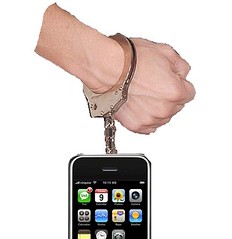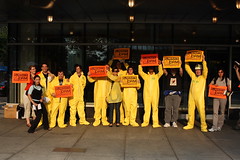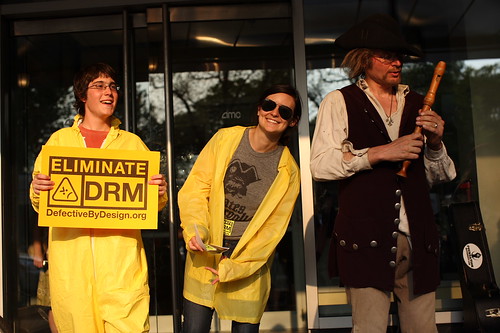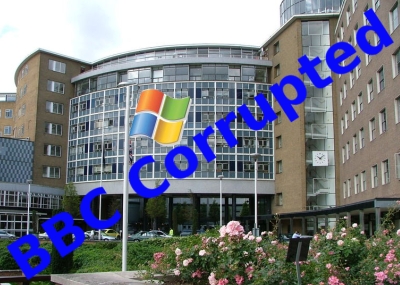drm
Refusing Digital Monitoring Policies

Bruce Schneier has brought a new form of Digital Restrictions Management to our attention:
Microsoft is doing some of the most creative thinking along these lines, with something it's calling "Digital Manners Policies." According to its patent application, DMP-enabled devices would accept broadcast "orders" limiting capabilities. Cellphones could be remotely set to vibrate mode in restaurants and concert halls, and be turned off on airplanes and in hospitals. Cameras could be prohibited from taking pictures in locker rooms and museums, and recording equipment could be disabled in theaters. Professors finally could prevent students from texting one another during class.
It sounds innocent enough, until Schneier pulls back the curtain to show the real motivation behind these policies:
Don't be fooled by the scare stories of wireless devices on airplanes and in hospitals, or visions of a world where no one is yammering loudly on their cellphones in posh restaurants. This is really about media companies wanting to exert their control further over your electronics. They not only want to prevent you from surreptitiously recording movies and concerts, they want your new television to enforce good "manners" on your computer, and not allow it to record any programs. They want your iPod to politely refuse to copy music a computer other than your own. They want to enforce their legislated definition of manners: to control what you do and when you do it, and to charge you repeatedly for the privilege whenever possible.
Consumers are objecting en masse to the idea of their own computers and devices continuously and indiscriminately policing their activities via Digital Restrictions Management. So it's no surprise that Microsoft is hatching plans to soft-pedal these same restrictions under the term "manners." This is just old wine in new bottles -- Microsoft wants another way to control your activities.
Since they would be the patent holder, they can profit from selling this ability to monitor and control you to others. There's no doubt that their main customers would be the same media distribution companies who are struggling to cripple the technology that makes them irrelevant -- technology that enables many more artists and creators to share their works directly with the public.
Microsoft's patent abstract says:
Similar to some of the social manners honored among people, such as with "no smoking" or "employees only" zones, "no swimming" or "no flash photography" areas, and scenarios for "please wash your hands" or "no talking out loud", devices may recognize and comply with analogous "device manners" policy.
It's common for companies pedaling digital restrictions to try to find parallels in the analog world, to make the restrictions seem familiar and correct. But these are flawed comparisons -- no machine covers your mouth with duct tape when you enter a "no smoking" zone just to make sure that you don't smoke. Nobody breaks your fingers to make sure that you don't use the flash on your camera in a museum.
Digital restrictions require you to hand over your privacy and freedom in advance. They are inherently unsafe because people other than the intended parties can access these mechanisms for monitoring and restricting you. They are inherently untrustworthy because you aren't legally allowed to know what's going on behind the scenes on the device in your pocket, including the contents of its continuous conversation with whichever corporation it's reporting to. The purpose of the restrictions might sound benign but their mechanism is unacceptable -- and what these companies are actually after is acceptance of the mechanism, so that they can then put it to other uses.
Digital Restrictions Management and "Digital Manners Policies" both use the fear that some people might not do the right thing to justify treating everyone like a criminal and taking away our freedom. We shouldn't accept this justification to cripple what are otherwise incredibly useful and powerful tools for innovation and creativity. "Digital Manners Policies" are really "Digital Monitoring Policies," and we should refuse them.
Welcoming Boston's new Apple Store
Last night the DRM Elimination Crew attended the grand opening of Apple's new store in Boston -- now its largest US store.
The clear glass front of the store stands in stark contrast to Apple's unethical business practices, including using opaque Digital Restrictions Management software to take rights away from its customers.
MSN Music to shut down, leaving DRM customers in the lurch
Microsoft is ceasing support for its MSN Music service. After August 31, 2008, people who have bought music from the service will no longer be able to move that music to different computers, or even change the operating system on their current computers.
CBC to offer popular TV program as a DRM-free download
The Canadian Broadcasting Corporation (CBC) has some excellent news for DRM-free living.
The CBC will be the first major North American broadcaster to release one of its programs without Digital Restrictions Management (DRM). On top of that, they will be using BitTorrent to distribute the program, which is "Canada's Next Great Prime Minister".
Apple says you can't read data on your own computer
It's yet another example of what we just talked about -- DRM doesn't just restrict copying of music files, it infects your entire system and turns it against you. Apple is explicitly preventing DTrace from examining or recording data for processes which don't "permit" tracing -- processes like, say iTunes.
Apple DRM obstructs legal creativity
People are seeing Digital Restrictions Management for what it is this week, thanks to Apple's "Fairplay" DRM scheme.
Another nasty DRM surprise from Netflix
Netflix DRM won't stream to HDD
When you buy into DRM technology, you put control over your computer in someone else's hands. This guarantees that unpredictable and unpleasant things will happen. Those with the DRM keys can decide that you no longer have the right to access the media you bought unless you agree to some new terms or buy some new tech, like Major League Baseball and Google Video have both done recently.
The Kindle Swindle
Warner Waking Up?
It's taking a while, but maybe Warner Music is finally starting to get the hint. They didn't get it after Steve Jobs showed initial signs of comprehension, so we decided back in April that someone needed to initiate a
DRM - Trash Vista, Not Your Computer
News reports and response from the BBC's Ashley Highfield
BBC iPlayer protest report
Read the Press Reports and Response from the BBC
We have had beautiful weather in London since I arrived in the UK on August 4. But today with the protest about to kick off it's tipping down. I'm in my hired car and "luckily" I get a puncture right outside BBC television center on Wood Lane. With no parking in the area, this gives me 90 minutes for the road side rescue to come and change my tire without getting towed. With hazmat suits, large signs and flyers to drop off, this makes life much easier.
BBC Corrupted
Zune DRM Cracked
Wired and others are carrying the story that Microsoft's ZUNE DRM has been cracked. Proving again, that just about any DRM scheme will be cracked sooner or later.
Awesome Anti-DRM T-shirts
TorrentFreak has announced the winners of their anti-DRM t-shirt contest. You can order shirts printed with the designs, or you can download the source files and print your own. The winners are strikingly effective designs and are a great way to get people thinking about DRM—I just ordered #3 for myself. Kudos to all 50 of the entering artists for taking the time to apply their skills to help communicate this important message, and congratulations to the winners!
Behind-The-Scenes Look at How DRM Becomes Law from Cory Doctorow
This afternoon Information Week published a great article by Cory Doctorow about how big corporations and shadowy associations and working groups collude to develop DRM schemes and the laws that mandate them.
The piece is very long, and very good. Everyone who is interested in this sort of thing should give it a read and then tell your friends and family about it.
Here is a choice excerpt from the beginning:
HMV joining online DRM Free MP3 Sellers
HMV seems like the latest big name to join the DRM Free MP3 sales market. Looks like they plan to undercut iTMS in an attempt to increase sales.
HMV and other bricks and mortar music stores haven't been doing so well of late as sales of physical CDs have been dropping.
Apple iPhone and DRM
 The iPhone hype hides a basic problem with the product – Digital Restrictions Management (DRM) inside the iPhone means that it wont be under your control. Apple has built this “smart” phone to dumb you down. They also want you to switch your cell phone service to AT&T – who collaborated with the National Security Agency (NSA) in its massive, illegal program to wiretap and data mine Americans' communications.
The iPhone hype hides a basic problem with the product – Digital Restrictions Management (DRM) inside the iPhone means that it wont be under your control. Apple has built this “smart” phone to dumb you down. They also want you to switch your cell phone service to AT&T – who collaborated with the National Security Agency (NSA) in its massive, illegal program to wiretap and data mine Americans' communications.
Early Results Are In: DRM Free Music Sells!
ArsTechnica reports thatEMI's DRM Free tracks on iTMS Plus are selling VERY well with double and triple digit percentage increases. As ArsTechnica points out, some of the increase could be a result of users looking to upgrade already purchased tracks, but that still means that users are willing to pay the extra 30 cents to loose the DRM.
EMI execs are expressing confidence that the trend will continue, and other labels are considering joining them, probably when more data has come in.
Free The BBC Site launched
Binary Freedom just launched FreeTheBBC.info with an open letter to the BBC regarding their decision to use proprietary formats and DRM despite overwhelming public comment early this year in support of open formats and content free of DRM.
Jeremy Allison on DRM not ever working
Just read a good piece by Jeremy Allison over on ZDNET. Why DRM won't ever work is a good explanation of the fundamental flaws with the concept and implementation of DRM. It is a great piece to share with folks who don't understand DRM.
DRM Free Clasical Music Downloads
The Christian Science Monitor has a good article about classical music without DRM.
The article makes the point that digital sales of classical music are pretty high and that classical music fans are willing to spend money on digital music sales for larger files.
Industry figures are hopeful that dropping copy protection – thus allowing for big, clear-sounding and noncompressed audio files – will generate even stronger interest in classical downloads.
and
TIME on DRM
Time Magazine ran an article last week about DRM. It gets alot right, and speaks in non geek terms:
Off the record, most executives--on the technology side at least--will tell you that DRM is a dinosaur that's waiting for the asteroid to hit. It's just a matter of when the music industry will stop assuming its customers are all criminals.
DRM Elimination Crew Hits The Streets
On Friday, DefectiveByDesign members hit the streets to tell the public about Disney, DRM and the Intellectual Property Protection Act 2007 (IPPA2007).
UPDATE: In Boston a large group composed of DefectiveByDesign members, and activists from FreeCulture.org and BinaryFreedom.info gathered, at Boston's main cinema on Boston Common.
In Boston a large group composed of DefectiveByDesign members, and activists from FreeCulture.org and BinaryFreedom.info gathered, at Boston's main cinema on Boston Common.

IPPA Disney DRM Fact Sheet
We created this fact sheet (PDF)for use at May 25th Actions around the world. Download your own copy, print some out and give them to friends.
FSF Launches PlayOgg.org
Alberto Gonzales Not Satsified with destroying Department of Justice...
On Monday the disgraced Attorney General Alberto Gonzales who has done a pretty good job of destroying the reputation of the Justice Department announced that he wants to destroy computer users rights by proposing laws to protect "intellectual property".
HBO wants us to stop using "DRM"
But they don't want to drop the restrictions! Earlier this week an HBO Executive, Bob Zitter, caught alot of flack in the blogosphere (and rightly so) for suggesting the only problem with DRM is the name, and that renaming the same restrictions "Digital Consumer Enablement" would solve the problem.
We like to point to a quote from a Disney exec from a ways back "If the consumer even knows there is a DRM we've lost." And by all accounts, they've all lost! Through the work of groups like ours, we have informed users about DRM. And now they don't want it.
BBC Chooses DRM
Earlier this week Boing Boing covered the BBC Trusts poor decision to opt for proprietary formats and DRM in their online offerings. Ars Technica has a good article on the decision. If you are a UK resident, you should continue to make your displeasure with DRM known to BBC.





